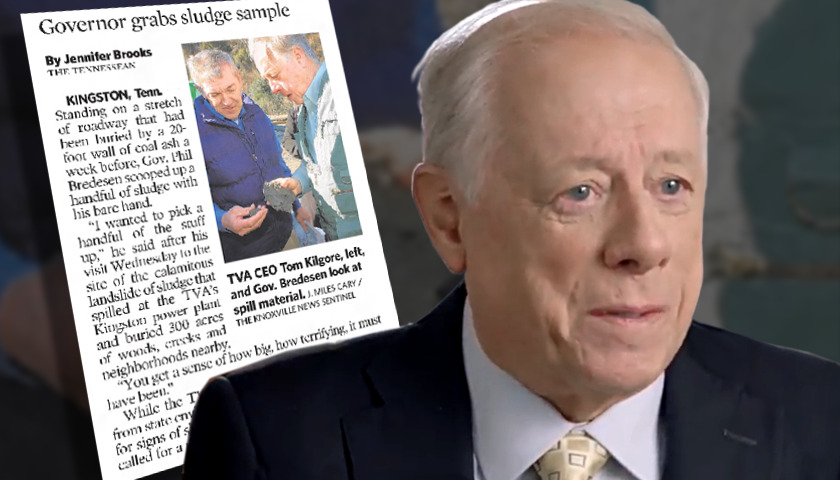Former Tennessee Gov. Phil Bredesen’s actions and comments following the 2008 Kingston coal ash spill arguably may have misled the public into thinking the situation wasn’t all that dangerous.
Newsweek later described it as “the largest industrial spill in U.S. history.”
Mother Nature Network, meanwhile, ranked the Kingston spill as one of the 10 worst manmade environmental disasters, alongside the Three Mile Island meltdown, the 1930s Dust Bowl, and the Exxon Valdez incident.
Bredesen is now the Democratic candidate for the U.S. Senate seat that Republican Bob Corker will soon vacate.
According to The Knoxville News Sentinel, more than 30 of the people who handled the cleanup — without protection — are now dead and more than 200 of them are sick or dying.
The spill happened December 22, 2008.
Bredesen reportedly didn’t show in Kingston for another nine days.
And when he did show he reportedly downplayed the hazards.
“This stuff, it’s not high-level waste. I don’t think people should be scared of the stuff,” Bredesen said of the sludge all around the site, according to the January 1, 2009 edition of The Tennessean.
“There’s a greater danger from air quality, from flying ash being ingested.”
Bredesen said this while state officials reportedly waited for the results of EPA tests on the solid waste at the site.
A photographer that day captured an image of Bredesen scooping up a handful of the sludge with his bare hand. According to the paper, state officials didn’t know what, precisely, Bredesen picked up, but he did venture a guess.
“This sludge is absolutely going to contain arsenic, lead, boron, thallium,” Bredesen said at the time.
One high-ranking state official was reportedly worried.
“Despite Bredesen’s confident sledge-handling in front of the media, the state health commissioner, Susan Cooper, who stood beside him, repeatedly urged him to wash his hands afterward,” according to The Tennessean.
“She also said people who visit the site should leave their shoes outside their houses when they get home and wash their clothes multiple times.”
Despite all the sickness and death that reportedly came later, Bredesen’s Department of Health put out a public health assessment, exactly one year after the spill, in December 2009. The PHA said “no harm to the community’s health is expected from touching the coal ash.”
“No harm to people’s health is expected from occasionally breathing coal ash if it should become airborne for short periods of time,” the PHA added.
According to the Associated Press in March 2009, a third of the people living within 1.5 miles of the Kingston plant reported respiratory problems, and about half of them experienced stress and anxiety.
“Only 66 percent of those who reported getting coal ash on their hands said they washed them afterward,” according to the website Facing South.
According to Mother Nature News Network, the spill happened after the walls of a dam holding 1.1 billion gallons of coal ash crumbled.
“The wave of ash, leftovers from burning coal mixed with water, wiped out roads, crumpled docks and destroyed homes,” according to the website.
The ash was stored at the nearby Tennessee Valley Authority coal power plant and contained a decade’s worth of arsenic, selenium, lead and radioactive materials.
“These metals can cause cancer, liver damage, neurological disorders and other health problems, but the EPA doesn’t classify coal ash as a hazardous material. As workers in Hazmat suits picked through the sludge, Kingston residents were told the ash didn’t present a serious health risk,” Mother Nature News went on to say.
A Duke University study later revealed toxic elements in the coal ash could get suspended in the air, posing a serious health risk.
The study also said coal ash contaminated waters, and accumulation of toxins in river sediment could poison fish. “Residents have reported numerous health problems — headaches, respiratory problems and seizures, among others — and scientists have found high levels of toxins in the tissues of fish in the Tennessee, Clinch and Emory rivers,” the website said.
“The long-term effects of coal ash on humans and wildlife remain largely unknown, and experts say the impact of the Tennessee coal ash spill may take decades to sort out.”
Three years ago, Bredesen appeared on TV to talk about his crisis management skills, especially when he was Nashville’s mayor and later Tennessee’s governor.
No one at Bredesen’s campaign returned The Tennessee Star’s request for comment this week.
– – –
Chris Butler is an investigative journalist at The Tennessee Star. Follow Chris on Facebook. Email tips to [email protected].









Great Story, not only did Bredesen downplay the incident, the TDEC fine the State of Tennessee gave TVA for Environmental damage amounted to nothing but a feather slap on the wrist. Ash ponds are a serious issue in Tennessee, but thanks to Bill Haslam’s TDEC Commissioner Bob Martineau the solution was to appoint a hold over from the liberal Bredesen administration. Who only degree was in journalism and who handle the Press releases and the spin room at the Kingston spill. This person was appointed to the Director of Water Resources. Who first act of Business was to take an a all expense taxpayer paid trip to China.
I agree with Cannoneer2 that neither side actually seems to give a hoot about the environment.
But the democrats have consistently been the party that claims the environmental highroad and toot their horn about how much they care about it. And if Bredesen learned anything from his university physics courses, he should know the dangers of heavy metals to the human body.
I think the point here is about hypocrisy.
Aside from Bredesen’s concern or lack thereof for environmental damage, I see a trend among conservatives to only use negative environmental news to jab a Democratic opponent. At least Bredesen has darkened the door of a university level science classroom (physics), unlike almost all other political types. As someone who worked as an environmental scientist for nearly ten years in Nashville, I am comfortable in saying that neither side actually cares at all.